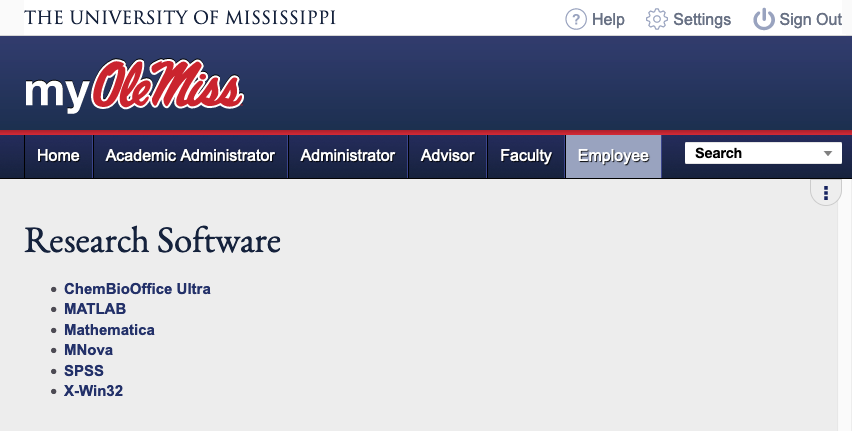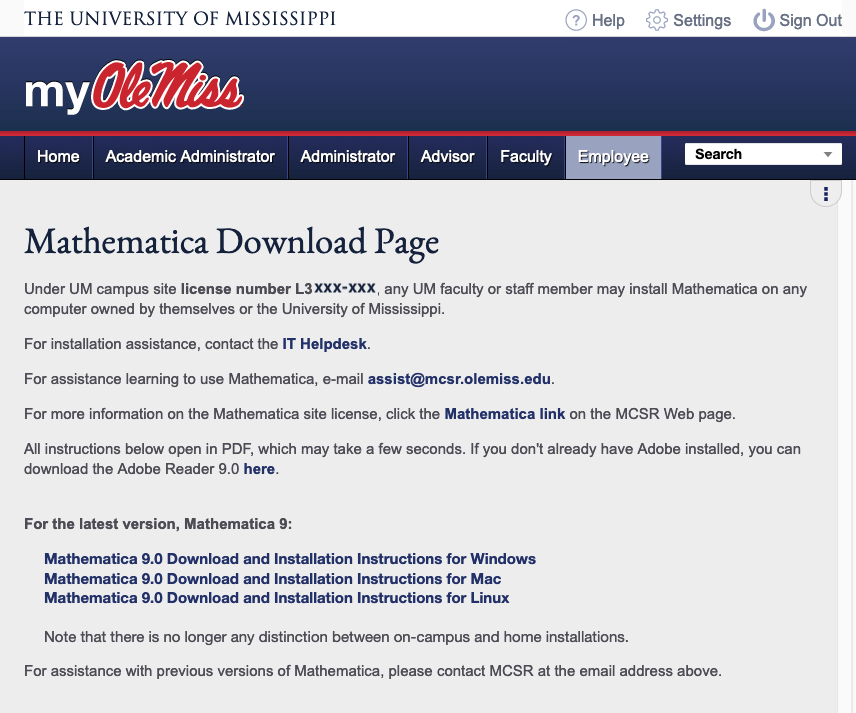Quantum Mechanics I
| Phys 711 — Fall 2025 |
| Department of Physics & Astronomy |
| Instructor: | Dr. Kevin Beach |
| Office: | 108A Lewis Hall |
| Email: | kbeach@olemiss.edu |
| Website: | https://www.phy.olemiss.edu/~kbeach |
Catalog description
Schrodinger’s equation and Hilbert spaces. Symmetry and conversation laws. Path integral quantization. Quantum theory of angular momentum. Systems of identical particles and many-electron atoms. Perturbation theory. Nonrelativistic scattering.
3 credit hours
Where and when
| Lectures: | M W F 10:00–10:50 in Lewis Hall Conference Room 104 |
| Office hours: | email me to book a time |
| Final exam: | Friday, December 12 at 08:00 |
Required text
| Principles of Quantum Mechanics, R. Shankar, Plenum Press; 2nd ed. (1994) |
| ISBN 9780306447907 [Amazon : UM Bookstore] |
Software
The University of Mississippi has a site licence for Wolfram Mathematica (currently version 14.2.1), which is a symbolic computation engine and scientific computing environment. The licence permits students, staff, and faculty to install one copy of the software on any of their personal computers. We will make use of Mathematica in Phys 711, so I encourage you to intall it. Please follows these steps:
- Login to my.olemiss.edu.
- Search for “Research Software” and click on “Mathematica.”
- Note the site licence number L3xxx-xxx at the top of the “Mathematica Download Page.”
- Open the instructions for your operating system (Mac, Windows, or Linux).
- Click on the Wolfram Portal link and create a user. Be sure to register with your university email (webid@go.olemiss.edu).
- Check your email account for an email from Wolfram with an email validation link. Look in your spam folder if you don’t see it.
- Then navigate to the Wolfram Activation Key Request Form.
- Fill out that form and wait on a reponse email.
- Follow the link in the email to download Mathematica.
- Run Mathematica and input the licence key.



Grading scheme
The course grade will be based on the cumulative points earned from weekly assignments, two in-class tests, and a final exam, weighted as follows.
| Assignments: | 40% |
| In-class tests: | 2 × 15% |
| Final exam: | 30% |
The numerical score (out of 100) will be converted to a letter grade with a corresponding grade point value, following the UM +/– grading system adopted in Fall 2011. The conversion is carried out by matching to the ranges shown in the table below.
| Letter grade | Grade point value | Numerical score range |
|---|---|---|
| A | 4.0 | ≥ 90 |
| A– | 3.7 | [85,90) |
| B+ | 3.3 | [80,85) |
| B | 3.0 | [75,80) |
| B– | 2.7 | [70,75) |
| C+ | 2.3 | [65,70) |
| C | 2.0 | [60,65) |
| C– | 1.7 | [55,60) |
| D | 1.0 | [50,55) |
| F | 0 | < 50 |
Class attendance — Regular attendance is strongly encouraged. Some material presented in lecture may not appear in the textbook.
Assignments — The course puts great emphasis on students’ developing technical mastery in a variety of important mathematical and computational techniques. Students will be regularly asked to attempt problems, both inside and outside of class hours, alone or in groups. Problems assigned as graded homework will be due in class on the designated due date. Late assignments will be penalized at the rate of 20% per day.
In-class tests — The tentative test dates are listed in this syllabus. Any changes to the dates will be announced in class and by email; students will be given at least one week’s notice. No make-up test will be given except in cases of verified emergencies.
Learning objectives
Students will become acquainted with the formalism of non-relativistic, few-particle quantum mechanics. They will develop a deeper appreciation for the mathematical structure of quantum theory and the important role that symmetry plays. They will learn to formulate quantum problems in terms of both Schrödinger’s wave equation and Heisenberg’s matrix mechanics. They will master a variety of exact and approximate solution strategies.
Topics likely to be covered
Fundamental Concepts — Hilbert space, kets and bras, matrix representations, change of basis, wave functions in position and momentum space
Quantum Dynamics — time evolution, Schrödinger versus Heisenberg picture, simple harmonic oscillator, Schrödinger’s wave equation, potentials and gauge transformations
Theory of Angular Momentum — rotations and angular-momentum commutation relations, spin-half systems, relationship between SO(3) and SU(2), eigenstates of angular momentum, Schrödinger equation for central potentials
Symmetry in Quantum Mechanics — symmetries, conservation laws, degeneracies, parity, space inversion, translation and crystal momentum, time-reversal
Approximate Methods — time-independent perturbation theory, variational methods
Identical Particles — permutation symmetry, symmetry postulate, two-electron system, helium atom
Learning objectives
Phys 711 focusses on building a quantum description of single-particle and noninteracting many-particle systems, including those with spin and orbital angular momenta. Students are expected to gain fluency in the matrix mechanics and wave mechanics formulations of quantum mechanics and to achieve technical proficiency in standard solution methods. Equally important, students are expected to develop an intuition for how physics operates at the quantum level.
By the end of the course, students should
-
be able to describe physical systems in terms of state vectors in a Hilbert space;
-
be able to represent the quantum state in various bases, including real space and momentum space, and to transform between them;
-
be able to solve for a system’s energy eigenstates and thereby predict the complete time evolution of any observable;
-
be able to take advantage of separation of variables (when applicable) to solve the Schödinger equation in two and three dimensions;
-
understand the connection between symmetries, their corresponding generators, and conservation laws;
-
know how to add angular momenta;
-
know how to symmetrize and anti-symmetrize with respect to interchange to construct bosonic and fermionic multi-particle states;
-
have have developed mastery of several standard methods for solving ordinary and partial differential equations;
-
be able to do some rudimentary scientific programming with Mathematica.
Schedule
The Fall 2025 semester runs August 25 to December 12. All relevant dates are listed here:
| August 25: Classes begin |
| M | Aug | 25 | Lecture 1 |
| W | Aug | 27 | Lecture 2 |
| F | Aug | 29 | Lecture 3 |
| August 29: Students may add courses on a space available basis through this date |
| September 1: Labor Day holiday; administrative offices closed |
| W | Sep | 3 | Lecture 4 |
| F | Sep | 5 | Lecture 5 |
| September 9: Last day to register or add classes (between August 30 and September 8 may add only with instructor’s approval); refund period ends |
| M | Sep | 8 | Lecture 6 |
| W | Sep | 10 | Lecture 7 |
| F | Sep | 12 | Lecture 8 |
| September 15: Mandatory drop date for non-attendance |
| M | Sep | 15 | Lecture 9 |
| W | Sep | 17 | Lecture 10 |
| F | Sep | 19 | Lecture 11 |
| M | Sep | 22 | Lecture 12 |
| W | Sep | 24 | Lecture 13 |
| F | Sep | 26 | First in-class test |
| M | Sep | 29 | Lecture 14 |
| W | Oct | 1 | Lecture 15 |
| F | Oct | 3 | Lecture 16 |
| M | Oct | 6 | Lecture 17 |
| W | Oct | 8 | Lecture 18 |
| F | Oct | 10 | Lecture 19 |
| October 13: Deadline for course withdrawals (no refund) |
| M | Oct | 13 | Lecture 20 |
| W | Oct | 15 | Lecture 21 |
| F | Oct | 17 | Lecture 22 |
| M | Oct | 20 | Lecture 23 |
| W | Oct | 22 | Lecture 24 |
| F | Oct | 24 | Lecture 25 |
| M | Oct | 27 | Lecture 26 |
| W | Oct | 29 | Lecture 27 |
| F | Oct | 31 | Second in-class test |
| M | Nov | 3 | Lecture 28 |
| W | Nov | 5 | Lecture 29 |
| F | Nov | 7 | Lecture 30 |
| M | Nov | 10 | Lecture 31 |
| W | Nov | 12 | Lecture 32 |
| F | Nov | 14 | Lecture 33 |
| M | Nov | 17 | Lecture 34 |
| W | Nov | 19 | Lecture 35 |
| F | Nov | 21 | Lecture 36 |
| November 22–30: Thanksgiving holidays (administrative offices closed Thursday and Friday) |
| M | Dec | 1 | Lecture 37 |
| W | Dec | 3 | Lecture 38 |
| F | Dec | 5 | Lecture 39 |
| December 5: Classes end |
| F | Dec | 12 | Final examination |
Attendance verification
The university requires that all students have a verified attendance at least once during the first two weeks of the semester for each course. Students whose attendance is not verified will be dropped from the course and any financial aid will be adjusted accordingly. Please see http://olemiss.edu/gotoclass for more information.
Academic integrity and honesty
Students are expected to adhere to the University of Mississippi Creed and the Standards of Honesty as described in Policy Code ACA.AR.600.001 and the M Book.
Students are reminded that cheating in any form will not be tolerated. Performance on all tests and assignments shall represent the individual work of the student. Those who violate the Standards of Honesty will be reported and subject to the appropriate sanction, which may include expulsion from the University.
Nondiscrimination policy
The University complies with all applicable laws regarding affirmative action and equal opportunity in all its activities and programs and does not discriminate against anyone protected by law because of age, color, disability, national origin, race, religion, sex, sexual orientation, handicap, or status as a veteran or disabled veteran.
Policies and procedures for students with disabilities
It is University policy to provide, on a flexible and individual basis, reasonable accommodations to students who have disabilities that may affect their ability to participate in course activities or meet course requirements. Students with disabilities should contact the Office of Student Disability Services (662-915-7128 or sds@olemiss.edu) to discuss their individual needs.
Examinations and last week of class
Regulations governing all examinations — A student’s failure to appear for an examination without an acceptable excuse, inability to present valid identification, absence from the room during the course of an examination without the consent of the examiner, or attempting any portion of an examination without submitting his or her answers shall result in failure of the examination. Tardiness beyond 15 minutes forfeits a student’s right to an examination.
Final examinations — A final examination, to be given at the time posted in the examination schedule, is required in each undergraduate course, unless the appropriate chair and dean have approved an exception. A student who has three or four final examinations in one day may arrange with the course instructor to take the noon or 7:30 p.m. examination at another time. In order to give a final examination at any time other than that shown in the posted examination schedule, an instructor must have prior approval of the department chair and dean.
Last week of class — The following guidelines exist to allow sufficient time for students and instructors to prepare for final examinations. These guidelines apply to the week preceding final examinations for undergraduate courses held during Fall and Spring semesters.
-
During the period of Wednesday through Friday of the last week of class, instructors are not to give exams, tests, or quizzes that contribute more than 10% of the final grade for a class.
-
Exceptions to the above statement are automatically made for lab-based courses, technical writing courses, seminar courses that assign a term paper, and senior design courses that assign a multi-faceted project in lieu of a final exam. Major projects of the above types, which contribute more than 10% of the final grade and which are due during this Last Week period, should be assigned in the syllabus at the beginning of the semester and any substantial change in the assignment should be made known to students before the drop deadline.
Student support services
The University Counseling Center is a professional facility offered by the University of Mississippi to assist students, faculty, and staff with many types of life stressors that interrupt day-to-day functioning. It offers individual counseling, couples counseling, group counseling, stress management, crisis intervention, assessments and referrals, outreach programs, consultations, and substance abuse services. There is no fee for currently enrolled University students, and anything that students say to a counselor is held in strict confidence. Contact the Counseling Center for information about mental health issues at https://counseling.olemiss.edu, counslg@olemiss.edu, 320 Lester Hall, and https://www.facebook.com/universitycounselingcenterolemiss/. Schedule an appointment or get information about appointments by calling the UCC at 662-915-3784.
Updated contact information
The University must have accurate contact information, including cell phone numbers, to facilitate student communications and contact tracing. Students should check and update their University contact information at https://olemiss.edu/mystudentprofile